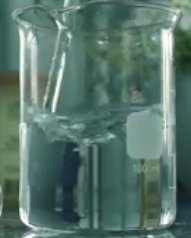C12-15 alkyl benzoate is composed of benzoic acid and long chain alcohol (12-15) produced by a reactive distillation or biocatalytic process leading to the esterification of benzoic acid with C12-15 alcohol.
The name describes the structure of the molecule:
- C12-15 Alkyl indicates that the compound contains an alkyl group, a type of hydrocarbon chain. The term 'C12-15' indicates that the alkyl chain can be of variable length, from 12 to 15 carbon atoms. This is a common way of indicating a mixture of compounds, as the exact length of the chain may vary in different batches of the ingredient.
- Benzoate indicates that the compound is an ester of benzoate, i.e. derived from benzoic acid. In an ester, the -OH (hydroxyl) group of the acid is replaced by an -O-alkyl (alkoxy) group. The synthesis of C12-15 alkyl benzoate typically involves an esterification reaction between benzoic acid and a mixture of alcohols with chain lengths between 12 and 15 carbon atoms.
Here is a simplified version of the steps involved:
- Esterification reaction. Benzoic acid is reacted with a mixture of alcohols (C12-15 alcohols) in the presence of an acid catalyst. This reaction produces C12-15 alkylbenzoate and water.
- Purification. The resulting ester is then purified, often through a distillation or recrystallisation process.
- It comes in the form of transparent colourless liquid or white powder.

What it is used for and where
Cosmetics
Skin conditioning agent - Emollient. Emollients have the characteristic of enhancing the skin barrier through a source of exogenous lipids that adhere to the skin, improving barrier properties by filling gaps in intercorneocyte clusters to improve hydration while protecting against inflammation. In practice, they have the ability to create a barrier that prevents transepidermal water loss. Emollients are described as degreasing or refreshing additives that improve the lipid content of the upper layers of the skin by preventing degreasing and drying of the skin. The problem with emollients is that many have a strong lipophilic character and are identified as occlusive ingredients; they are oily and fatty materials that remain on the skin surface and reduce transepidermal water loss. In cosmetics, emollients and moisturisers are often considered synonymous with humectants and occlusives.
Antimicrobial agent. This ingredient is able to suppress or inhibit the growth and replication of a broad spectrum of microorganisms such as bacteria, fungi and viruses by making the stratum corneum temporarily bactericidal and fungicidal.
Skin conditioning agent. It is the mainstay of topical skin treatment as it has the function of restoring, increasing or improving skin tolerance to external factors, including melanocyte tolerance. The most important function of the conditioning agent is to prevent skin dehydration, but the subject is rather complex and involves emollients and humectants that can be added in the formulation.
It also reduces the perception of oil on the skin and increases the spreadability. Other interesting features are the extreme solubility and long-term maintenance of a fragrance.
C12-15 alkyl benzoate it is used in antiperspirants. sun creams and more.
Safety.
From the available data, the impurities present do not pose a hazard to human health and the EFSA Panel on the Safety of Ingredients considers this and other benzoates to be safe when incorporated into cosmetic products (1).
Commercial Applications
Cosmetic and Personal Care Industry. Widely used as an emollient in products like lotions, sunscreens, and makeup. It improves the feel on the skin, reducing greasy feel and leaving a smooth finish.
Hair Conditioning Agents. Used in conditioners and hair treatments to enhance softness and ease of combing.
Formulation Stabilizer. Helps to stabilize emulsions and improve the water resistance of products, especially in sunscreens.
Solubilizer for Fragrances and Perfumes. Acts as a carrier for fragrances, enhancing their longevity on the skin.
For more information:
C12-15 alkyl benzoate studies

- Molecular Formula: C19H30O2
- Molecular Weight: 290.447 g/mol
- UNII: N4F51K239A
- CAS: 68411-27-8 2915-72-2 27615-31-2
- EC Number: 270-112-4 220-837-7
Synonyms:
- Dodecyl benzoate
- Benzoic acid, dodecyl ester
- Lauryl benzoate
- Alkyl (C12-15) benzoate
- Benzoic acid dodecyl ester
- Alkyl (C12-15) Benzoate [USAN]
- C12-C15 Alkyl Benzoate
- Benzoic acid dodecylester
- Alkyl (C12-15) benzoate [NF]
- Benzoic acid, C12-15 alkyl ester
- Benzoic acid, C12-15 alkyl esters
References_____________________________________________________________________
(1) Becker LC, Bergfeld WF, Belsito DV, Hill RA, Klaassen CD, Liebler D, Marks JG Jr, Shank RC, Slaga TJ, Snyder PW, Andersen FA. Safety assessment of alkyl benzoates as used in cosmetics. Int J Toxicol. 2012 Nov-Dec;31(6 Suppl):342S-72S. doi: 10.1177/1091581812467379.
Abstract. The functions of alkyl benzoates in cosmetics include fragrance ingredients, skin-conditioning agents--emollient, skin-conditioning agents--miscellaneous, preservatives, solvents, and plasticizers. The Cosmetic Ingredient Review Expert Panel reviewed the relevant animal and human data and noted gaps in the available safety data for some of the alkyl benzoates. Similar structure activity relationships, biologic functions, and cosmetic product usage allowed the available data of many of the alkyl benzoates to be extended to the entire group. Carcinogenicity data were not available, but available data indicated that these alkyl benzoate cosmetic ingredients are not genotoxic. Also benzoic acid and tested component alcohols were not reproductive or developmental toxicants, are not genotoxic in almost all assays, and are not carcinogenic. These ingredients were determined to be safe in the present practices of use and concentration.
![]() C12-15 alkyl benzoate
C12-15 alkyl benzoate 



